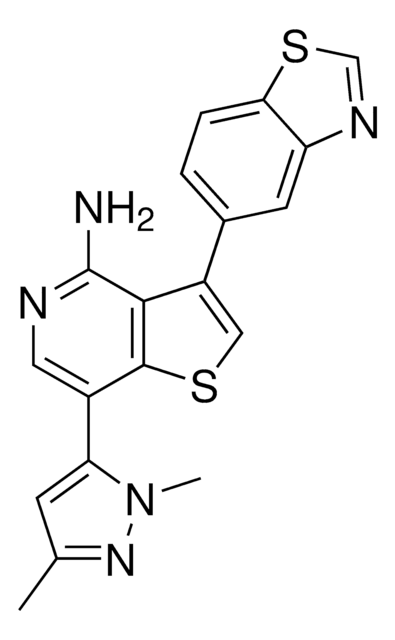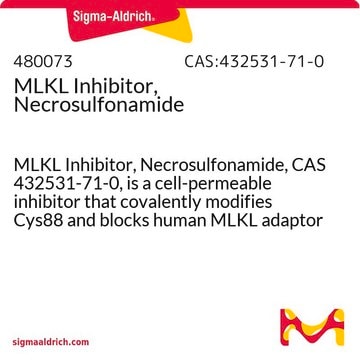5.30389
GSK′872
≥98% (HPLC), solid, RIPK3 inhibitor, Calbiochem®
Sinónimos:
RIPK3 Inhibitor, GSK′872, N-(6-(Isopropylsulfonyl)quinolin-4-yl)benzo[d]thiazol-5-amine, RIP3 Kinase Inhibitor I, Receptor-Interacting Protein Kinase 3 Inhibitor I, GSK-872, Necrosis Inhibitor V, RIPK3 Inhibitor I
About This Item
Productos recomendados
product name
RIPK3 Inhibitor, GSK′872,
assay
≥98% (HPLC)
Quality Level
form
solid
manufacturer/tradename
Calbiochem®
storage condition
OK to freeze
protect from light
color
yellow
solubility
DMSO: 100 mg/mL
storage temp.
2-8°C
General description
Biochem/physiol Actions
RIP3 Kinase
Packaging
Warning
Reconstitution
Other Notes
Legal Information
Storage Class
11 - Combustible Solids
wgk_germany
WGK 3
flash_point_f
Not applicable
flash_point_c
Not applicable
Certificados de análisis (COA)
Busque Certificados de análisis (COA) introduciendo el número de lote del producto. Los números de lote se encuentran en la etiqueta del producto después de las palabras «Lot» o «Batch»
¿Ya tiene este producto?
Encuentre la documentación para los productos que ha comprado recientemente en la Biblioteca de documentos.
Nuestro equipo de científicos tiene experiencia en todas las áreas de investigación: Ciencias de la vida, Ciencia de los materiales, Síntesis química, Cromatografía, Analítica y muchas otras.
Póngase en contacto con el Servicio técnico








